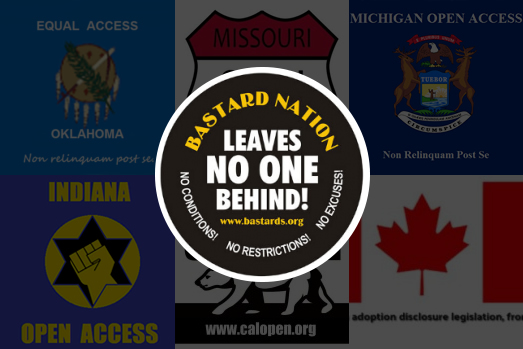Bastard Nation: The Adoptee Rights Organization
PO Box 4607
New Windsor, New York 12553-7845
bastards.org 614-795-6819 @BastardsUnite
bastardnation3@gmail.com
__________
TO: The Vermont Senate Judiciary Committee
FROM: Marley Greiner, Executive Chair
RE: Letter of support for HB 629, (adoptee access to original birth certificates) Vote Do Pass
DATE: March 22, 2022
Bastard Nation: the Adoptee Rights Organization is the largest adoptee civil rights organization in the United States. We support only full unrestricted access for all adopted persons to their original birth certificates (OBC) and related documents. We are a core partner in the New England Adoptee Rights Coalition.
We support HB 629 as written, a “clean biil” with no restrictions, already passed by the Vermont House.
Current Law v HB 1329
Until 1945 all Vermont-born adopted citizens had full access to their original birth certificates. That year the legislature, for reasons we can only guess now, terminated that right and sealed that access. That was 77 years ago. Harry Truman was president and World War 2 was just ending.
Since then the legal situation of Vermont adoptees has changed little. Current Vermont law permits some adopted adults to obtain their OBCs and other identifying information through application to the state-operated Vermont Adoption Registry. Applying to this mutual consent registry is a cumbersome, difficult, and infantilizing procedure that bears limited results. The registry dishes out favors for the few if a match is made, while the overwhelming majority of adoptees remain without inclusive and codified rights.
HB 629 does way with this arduous procedure and restores the right of all Vermont-born adopted people to obtain their OBCs upon request at the age of majority with no restrictions or conditions. The adoptee would simply fill out a form and submit it directly to the Department of Vital Records, and for a nominal fee, receive their OBC. The bill, however, retains the registry, where other information might be located and made available to the adoptee if there is a consensual match with a birthparent. To be clear: The registry procedure is separate from the OBC access procedure and a match is not required to obtain the OBC.
Civil Rights, Privacy, and the Balance of Rights
HB 629 is not about search and reunion, though search and reunion can happen The bill is about civil rights.
We often hear the term “balance of rights” in the OBC debate. That can be a legitimate debate in cases where an actual conflict of rights among parties exists. In the case of OBC rights, however, the only rights involved are those of 30,000 adopted Vermonters who are legally barred from obtaining the genuine unaltered record of their birth. Barred from obtaining a public record-–an intimate public record–that is about them and their origins. Barred from obtaining a pubic record with their name in it. These 30,000 people are not abstracts. They are real people like the witnesses who appear in person at this hearing, like the individuals who send you emails, and call you on the phone, who meet with you at campaign stops. You probably know adopted people who will personally benefit from passage of HB 629: family members, co-workers, friends, neighbors, constituents who want—and need—you to support them.
Rights and interests are not equal. A few birthparents might argue a “right” to birthparent anonymity, but courts have ruled that there no such right, (see below). Third parties with their own political and social agendas might claim an ”interest” in keeping OBCs out of the hands of adoptees, but that is far from a right—only an opinion.“Rights” trump “interests.”
The idea that a person can be barred from the true record of their birth due to the circumstances of their birth or the status of their family is absurd and unjust. The Adopted and the Not Adopted have an absolute right to obtain the official state record of their own birth and no third party–parent or not–has the “right” or the standing to legally bar that access. Parental rights of birthparents were voluntarily relinquished years ago or were terminated by a court. After termination, those parents had no say in the disposition of the child or the records. Even if there was such a parental “right” to bar one’s adult offspring from obtaining their birth certificate, it would not exist in the case of adoption.
Adoption Privacy Overview
Unrestricted OBC access is not a “privacy” or “birthparent confidentiality” issue. “Privacy” “confidentiality,” and” anonymity” are not synonymous either legally or linguistically. “Anonymity “is a myth perpetuated by special interests that for decades have profited off of economic distress and society-induced shame and family crisis. In many cases, adoption is a permanent solution to a temporary problem that has not only individual but generational consequences.
There is no evidence in any state that records were sealed to “protect” the reputation or “privacy” of biological parents who relinquished children for adoption. On the contrary, records were sealed to cover coercive child acquisition practices by adoption agencies, black and gray market baby dealers, exploitative assembly line maternity homes, and other corrupt systems. Numerous historical and legal researchers and writers have shown that OBCs were never intended to be sealed in perpetuity from individual adoptees as adults. At “best” sealed OBCs were billed as a way to protect the reputations of “bastard children” (not adults) and to protect adoptive families from birthparent and stranger interference; in other words to “protect the integrity of the adoptive family.” These documents were first sealed from the public, then the parties to the adoption, and eventually to adopted people themselves. What was once an outlier practice has now been normalized through a mix of myth and “tradition” and treated like ”the way it’s always been.”
Courts, however, have ruled that adoption anonymity does not exist. (Doe v Sundquist, et. al., 943 F. Supp. 886, 893-94 (M.D. Tenn. 1996) and Does v. State of Oregon, 164 Or. App. 543, 993 P.2d 833, 834 (1999). Laws change constantly, and the state, lawyers, social workers, and others were never in a position to promise anonymity in adoption. In the over 60 years of the adoptee equality battle, not one document has been submitted anywhere that promises or guarantees sealed records and an anonymity “right” to birthparents.
Identifying information about surrendering parents often appears in court documents given to adoptive parents who can at any point give that information to the adopted person. (In some states adoptive parents, at the time of the adoption order, can petition the court to keep the record open.) The names of surrendering parents are published in legal ads. Courts can open “sealed records” for “good cause” without birthparent consent or even knowledge. Critically, the OBC is sealed at the time of adoption finalization, not surrender. If a child is not adopted, the record is never sealed. If a child is adopted, but the adoption is overturned or disrupted, the OBC is unsealed. Please remember that the OBCs of persons with established relationships with biological parents as in stepparent and foster adoptions are also sealed.
The American Academy of Adoption and Assisted Reproduction Attorneys agrees with this assessment. In a major about-face, in 2018 it passed a monumental resolution in support of adoptees’ right to full access to our OBCs court, and agency records.
Privacy and Technology
Today, inexpensive and accessible DNA testing services, and a large network of volunteer “search angels” that locate adoptee government-hidden information, histories, and biological families, has made the traditional “privacy” argument obsolete. The minuscule number of birthparents or professionals who believe that restricted OBC/records access or no access equals adoption anonymity are greatly mistaken. Nearly all successful searches are done without the OBC and other court documents.
Conclusion
OBC access is not about search and reunion Many adopted people are not interested in pursuing those. Instead, access is about obtaining our state-generated and held document of our birth, something the Not Adopted obtain without a second thought.
There is no state interest in keeping original birth certificates sealed from adult adoptees to which they pertain nor does the state have a right or duty to mediate and oversee the personal relationships of adults. The debate on the release of OBCs to its adopted citizens is a small v large government issue. Small government should win this one.
Adopted people in 10 states have unrestricted access to their OBCs. Not one single negative report about unsealing has been published. Access has been normalized. Adoptees are treated just like the Not Adopted, and like the Not Adopted, no one denies that they have a right to that record and information.
Just last week HB 629 bill passed the House to an astounding 149-1 vote, happy proof that lawmakers in Vermont understand the need to restore OBC rights to their 30,000 adoptees We believe that the Senate agrees with the House that all Vermont adoptees deserve to be re-enfranchised, and that you will support this bill.
Please vote Do Pass on HB 629 as written. It’s the right thing to do. Thank you
________________
Bastard Nation is dedicated to the recognition of the full human and civil rights of adult adoptees. Toward that end, we advocate the opening to adoptees, upon request at age of majority, of those government documents which pertain to the adopter’s historical, genetic, and legal identity, including the unaltered original birth certificate and adoption decree. Bastard Nation asserts that it is the right of people everywhere to have their official original birth records unaltered and free from falsification and that the adoptive status of any person should not prohibit him or her from choosing to exercise that right. We have reclaimed the badge of bastardy placed on us by those who would attempt to shame us; we see nothing shameful in having been born out of wedlock or in being adopted. Bastard Nation does not support mandated mutual consent registries or intermediary systems in place of unconditional open records, nor any other system that is less than access on demand to the adult adoptee, without condition, and without qualification.





